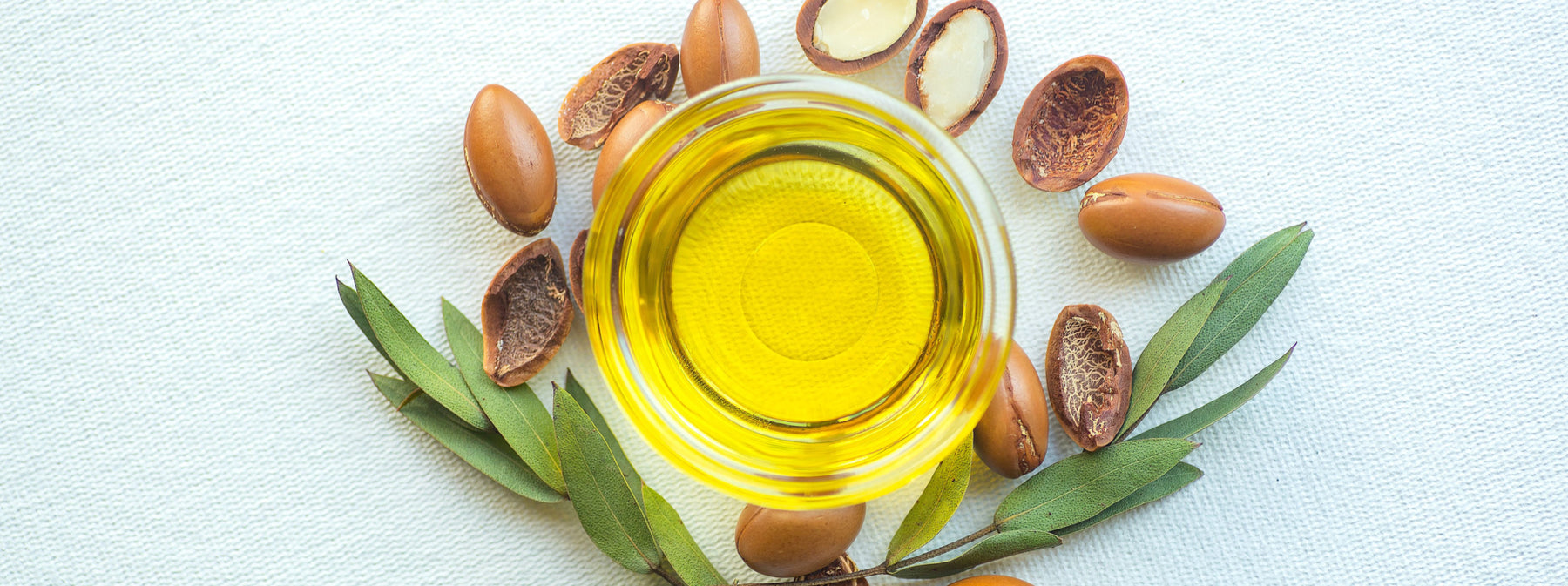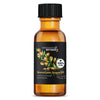
How to Use Moroccan Oil for Hair: A Complete Guide
Moroccan Oil, derived from the Argan tree native to Morocco, is a natural elixir packed with vitamins, antioxidants, and fatty acids that may promote healthy hair.
In this article, we’ll explore what Moroccan Oil is, the topical benefits of this natural treatment, and delve into the best ways to use Moroccan Oil for different hair types and concerns.
What Is Moroccan Oil?

Moroccan Oil, often used interchangeably with Argan Oil, has gained a large amount of popularity in the beauty and hair care industry for its incredible nourishing properties.
The extraction process involves a labor-intensive method, where the fruit of the Argan tree is picked, dried, and cracked open to reveal the small seeds within. These seeds are then cold-pressed to yield the precious golden oil known for its exceptional beauty benefits. Cold-pressing involves grinding and compressing the seeds in a machine until the oil is extracted and collected.
Although this oil is mainly composed of Argan Oil, it is often blended with additives, like silicones, for enhanced hair protection.
These additives help to create a lightweight, easily spreadable formulation that coats the hair, providing protection against humidity and environmental damage.
These nourishing properties have made Moroccan Oil a staple in beauty routines worldwide.
Topical Benefits of This Natural Treatment
Before you use this powerful oil in your hair care routine, it's a good idea to know about the fantastic benefits it brings. So, let's talk about the top 3 incredible potential benefits this remarkable treatment offers for your hair:
1. Fatty Acids May Provide Hair Nourishment
Moroccan Oil is abundant in essential fatty acids, such as omega-3 and omega-9, which deeply nourish the hair strands, promoting overall health and shine. When applied to the lengths of the hair, fatty acids form a protective layer that can help make the hair more manageable for styling.
2. Silicones Might Be Perfect for Frizz Control
The silicones present in Moroccan Oil form a protective shield around each hair strand, helping to tame frizz and flyaways, leaving the hair sleek and shiny. They also seal in moisture to prevent dry and brittle ends.
3. Antioxidants Can Provide Protection from Oxidative Damage
The Argan Oil present in this treatment may prevent oxidative damage caused by UV rays and pollution when applied as a pre-treatment to the hair prior to exposure to these factors. These external factors can negatively impact hair by causing hair color to fade, weaken the hair proteins, and cause dryness.
What Is the Best Way to Use Moroccan Oil?
Depending on your hair type and the level of damage you want to address, there are different ways to best use Moroccan Oil. Below, we’ll break down all the information you’ll need to determine the best method for you. Here's how to make the most of its benefits:
Easy Moroccan Oil Hair Care Routine for All Hair Types
If you’d like to experience the full benefits of Moroccan Oil, there are several ways to incorporate it into your hair care routine. Start by applying a small amount, about a dime-sized drop, and rub it between your palms to warm it up.
Then, work the oil through your damp, towel-dried hair, focusing primarily on the mid-lengths and ends. Avoid applying it to the roots to prevent your hair from appearing greasy and prevent product build-up at the roots.
Additionally, you can mix 3-5 drops of Moroccan Oil into your favorite shampoo and conditioner for an added nourishing boost. For regular use, applying Moroccan Oil 2-3 times a week is recommended.
For a more intensive treatment, consider using Moroccan Oil as an overnight treatment. Apply a generous amount to your hair before bedtime, cover it with a shower cap or a silk cloth, and wash it out in the morning.
This deep conditioning overnight treatment can leave your hair feeling luxuriously nourished and rejuvenated.
How to Use Moroccan Oil for Curly Hair
Curly hair often requires extra care and hydration, and Moroccan Oil is perfect for providing just that.
To apply, start by working Moroccan Oil into your damp hair, section by section, ensuring even distribution throughout your gorgeous curls. Gently scrunch your hair to encourage the natural formation of curls.
Now, you have two options for styling your curls. Let your hair air dry to enhance your curls' natural beauty, or use a diffuser on low heat to minimize frizz and maintain your curl definition. Use a high-quality heat protectant to prevent heat damage, and finish off your style with a couple more drops of Moroccan Oil for added shine.
On days when you don't wash your hair, you can refresh your curls by mixing a small amount of Moroccan Oil with water in a spray bottle. Lightly mist the mixture over your curls to revitalize and hydrate them, keeping those curls looking fantastic throughout the day.
The Ultimate Moroccan Oil Routine for Dry, Damaged Hair
If your hair is damaged and in need of some extra TLC, Moroccan Oil can come to the rescue.
As a pre-shampoo treatment, generously apply Moroccan Oil to your hair before washing it. Leave it on for about 30 minutes to an hour, allowing the oil to deeply penetrate your hair shafts to restore moisture. Optionally, you can cover up your hair with a silk cap or regular shower cap to help lock in moisture.
This pre-shampoo treatment is especially effective in minimizing damage caused by cleansing agents, leaving your hair feeling softer and healthier. The vitamins, phytonutrients, and antioxidants present in Moroccan Oil can penetrate the hair shaft to infuse it with nourishment and moisture. In addition, the silicones coat the hair to reduce the look of split ends and breakage.
After washing your hair, consider using Moroccan Oil as a leave-in conditioner. Apply 2-3 drops evenly to damp hair, and let it work its magic. This leave-in treatment helps maintain moisture levels and acts as a protective barrier, shielding your hair from further damage caused by environmental factors and styling tools.
Embrace Beautiful Hair With Moroccan Oil

By making Moroccan Oil part of your hair care routine, you just might be able to transform your damaged hair into beautiful, manageable tresses. Keep in mind that, whatever your hair type, you should only use a Moroccan Oil that is tested and certain to be pure, like our Moroccan Oil.
Don't forget to experiment with creating your own DIY hair serum using Moroccan Oil as the star ingredient. Mixing this oil with other nourishing oils and your favorite essential oils can create a customized leave-in serum treatment that caters to your unique hair needs, leaving you with healthy, shiny locks.
If you’re looking for a completely natural product without any additives or synthetic fragrances, consider trying pure Argan Oil, one of the key components of Moroccan Oil. At Wholesale Botanics, we conduct rigorous testing to ensure the composition and appearance meet all quality standards. Our Argan Oil is carefully produced to preserve the critical nutrients your hair requires.
